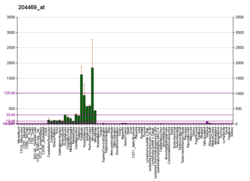PTPRZ1
Receptor-type tyrosine-protein phosphatase zeta also known as phosphacan is an enzyme that in humans is encoded by the PTPRZ1 gene.[5][6][7]
Function
This gene is a member of the receptor tyrosine phosphatase family and encodes a single-pass type I membrane protein with two cytoplasmic tyrosine-protein phosphatase domains, an alpha-carbonic anhydrase domain and a fibronectin type III domain. Alternative splice variants that encode different protein isoforms have been described but their full-length nature has not been determined.[7]
Clinical significance
Expression of this gene is induced in gastric cancer cells, in the remyelinating oligodendrocytes of multiple sclerosis lesions, and in human embryonic kidney cells under hypoxic conditions. Both the protein and transcript are overexpressed in glioblastoma cells, promoting their haptotactic migration.[7]
References
- GRCh38: Ensembl release 89: ENSG00000106278 - Ensembl, May 2017
- GRCm38: Ensembl release 89: ENSMUSG00000068748 - Ensembl, May 2017
- "Human PubMed Reference:". National Center for Biotechnology Information, U.S. National Library of Medicine.
- "Mouse PubMed Reference:". National Center for Biotechnology Information, U.S. National Library of Medicine.
- Ariyama T, Hasegawa K, Inazawa J, Mizuno K, Ogimoto M, Katagiri T, Yakura H (Jun 1995). "Assignment of the human protein tyrosine phosphatase, receptor-type, zeta (PTPRZ) gene to chromosome band 7q31.3". Cytogenet Cell Genet. 70 (1–2): 52–4. doi:10.1159/000133990. PMID 7736789.
- Levy JB, Canoll PD, Silvennoinen O, Barnea G, Morse B, Honegger AM, Huang JT, Cannizzaro LA, Park SH, Druck T (Jun 1993). "The cloning of a receptor-type protein tyrosine phosphatase expressed in the central nervous system". J Biol Chem. 268 (14): 10573–81. PMID 8387522.
- "Entrez Gene: PTPRZ1 protein tyrosine phosphatase, receptor-type, Z polypeptide 1".
Further reading
- Krueger NX, Saito H (1992). "A human transmembrane protein-tyrosine-phosphatase, PTP zeta, is expressed in brain and has an N-terminal receptor domain homologous to carbonic anhydrases". Proc. Natl. Acad. Sci. U.S.A. 89 (16): 7417–21. doi:10.1073/pnas.89.16.7417. PMC 49721. PMID 1323835.
- Kaplan R, Morse B, Huebner K, Croce C, Howk R, Ravera M, Ricca G, Jaye M, Schlessinger J (1990). "Cloning of three human tyrosine phosphatases reveals a multigene family of receptor-linked protein-tyrosine-phosphatases expressed in brain". Proc. Natl. Acad. Sci. U.S.A. 87 (18): 7000–4. doi:10.1073/pnas.87.18.7000. PMC 54670. PMID 2169617.
- Krueger NX, Streuli M, Saito H (1990). "Structural diversity and evolution of human receptor-like protein tyrosine phosphatases". EMBO J. 9 (10): 3241–52. doi:10.1002/j.1460-2075.1990.tb07523.x. PMC 552056. PMID 2170109.
- Morton SM, Veile RA, Helms C, Lee M, Kuo WL, Gray J, Donis-Keller H (1998). "Subregional localization of 21 chromosome 7-specific expressed sequence tags (ESTs) by FISH using newly identified YACs and P1s". Genomics. 46 (3): 491–4. doi:10.1006/geno.1997.5051. PMID 9441757.
- Onyango P, Lubyova B, Gardellin P, Kurzbauer R, Weith A (1998). "Molecular cloning and expression analysis of five novel genes in chromosome 1p36". Genomics. 50 (2): 187–98. doi:10.1006/geno.1997.5186. PMID 9653645.
- "Toward a complete human genome sequence". Genome Res. 8 (11): 1097–108. 1999. doi:10.1101/gr.8.11.1097. PMID 9847074.
- Maeda N, Ichihara-Tanaka K, Kimura T, Kadomatsu K, Muramatsu T, Noda M (1999). "A receptor-like protein-tyrosine phosphatase PTPzeta/RPTPbeta binds a heparin-binding growth factor midkine. Involvement of arginine 78 of midkine in the high affinity binding to PTPzeta". J. Biol. Chem. 274 (18): 12474–9. doi:10.1074/jbc.274.18.12474. PMID 10212223.
- Kawachi H, Tamura H, Watakabe I, Shintani T, Maeda N, Noda M (1999). "Protein tyrosine phosphatase zeta/RPTPbeta interacts with PSD-95/SAP90 family". Brain Res. Mol. Brain Res. 72 (1): 47–54. doi:10.1016/S0169-328X(99)00204-1. PMID 10521598.
- Meng K, Rodriguez-Peña A, Dimitrov T, Chen W, Yamin M, Noda M, Deuel TF (2000). "Pleiotrophin signals increased tyrosine phosphorylation of beta beta-catenin through inactivation of the intrinsic catalytic activity of the receptor-type protein tyrosine phosphatase beta/zeta". Proc. Natl. Acad. Sci. U.S.A. 97 (6): 2603–8. doi:10.1073/pnas.020487997. PMC 15975. PMID 10706604.
- Kawachi H, Fujikawa A, Maeda N, Noda M (2001). "Identification of GIT1/Cat-1 as a substrate molecule of protein tyrosine phosphatase zeta /beta by the yeast substrate-trapping system". Proc. Natl. Acad. Sci. U.S.A. 98 (12): 6593–8. doi:10.1073/pnas.041608698. PMC 34398. PMID 11381105.
- Thomaidou D, Coquillat D, Meintanis S, Noda M, Rougon G, Matsas R (2001). "Soluble forms of NCAM and F3 neuronal cell adhesion molecules promote Schwann cell migration: identification of protein tyrosine phosphatases zeta/beta as the putative F3 receptors on Schwann cells". J. Neurochem. 78 (4): 767–78. doi:10.1046/j.1471-4159.2001.00454.x. PMID 11520897.
- Harroch S, Furtado GC, Brueck W, Rosenbluth J, Lafaille J, Chao M, Buxbaum JD, Schlessinger J (2002). "A critical role for the protein tyrosine phosphatase receptor type Z in functional recovery from demyelinating lesions". Nat. Genet. 32 (3): 411–4. doi:10.1038/ng1004. PMID 12355066.
- Müller S, Kunkel P, Lamszus K, Ulbricht U, Lorente GA, Nelson AM, von Schack D, Chin DJ, Lohr SC, Westphal M, Melcher T (2003). "A role for receptor tyrosine phosphatase zeta in glioma cell migration". Oncogene. 22 (43): 6661–8. doi:10.1038/sj.onc.1206763. PMID 14555979.
- Bonora E, Lamb JA, Barnby G, Sykes N, Moberly T, Beyer KS, Klauck SM, Poustka F, Bacchelli E, Blasi F, Maestrini E, Battaglia A, Haracopos D, Pedersen L, Isager T, Eriksen G, Viskum B, Sorensen EU, Brondum-Nielsen K, Cotterill R, van Engeland H, de Jonge M, Kemner C, Steggehuis K, Scherpenisse M, Rutter M, Bolton PF, Parr JR, Poustka A, Bailey AJ, Monaco AP (2005). "Mutation screening and association analysis of six candidate genes for autism on chromosome 7q". Eur. J. Hum. Genet. 13 (2): 198–207. doi:10.1038/sj.ejhg.5201315. PMID 15523497.
- Polykratis A, Katsoris P, Courty J, Papadimitriou E (2005). "Characterization of heparin affin regulatory peptide signaling in human endothelial cells". J. Biol. Chem. 280 (23): 22454–61. doi:10.1074/jbc.M414407200. PMID 15797857.
- Wang V, Davis DA, Haque M, Huang LE, Yarchoan R (2005). "Differential gene up-regulation by hypoxia-inducible factor-1alpha and hypoxia-inducible factor-2alpha in HEK293T cells". Cancer Res. 65 (8): 3299–306. doi:10.1158/0008-5472.CAN-04-4130. PMID 15833863.
- Lu KV, Jong KA, Kim GY, Singh J, Dia EQ, Yoshimoto K, Wang MY, Cloughesy TF, Nelson SF, Mischel PS (2005). "Differential induction of glioblastoma migration and growth by two forms of pleiotrophin". J. Biol. Chem. 280 (29): 26953–64. doi:10.1074/jbc.M502614200. PMID 15908427.




